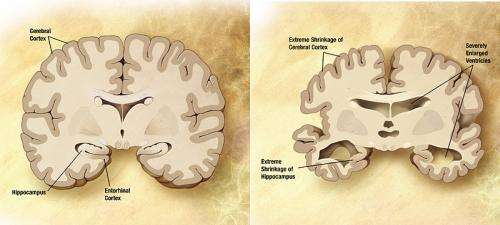November 6, 2014 report
Biotech company develops way to carry antibodies across blood-brain barrier to treat Alzheimer's

(Medical Xpress)—A team of researches with the biotech firm Genentech Inc has found a way to carry an antibody across the blood-brain barrier using transferrin in a monkey. In their paper published in the journal Science Translational Medicine, the team describes how they came up with the technique, how it works, and how it might be used to help prevent Alzheimer's disease.
One of the biggest hurdles in treating Alzheimer's disease has been figuring out how to get medication into the brain via the bloodstream. The problem comes about due to the blood-brain barrier—nature's way of preventing pathogens from getting into the central nervous system—it's a layer of cells that line the insides of capillaries that only allow specific, very tiny substances through. Substances that do get through the barrier are carried across the barrier by a protein called transferrin—iron, for example, is carried across this way. In this new effort, the researchers found a way to trick transferrin into carrying an antibody they'd created that once inside the brain, released a chemical that targeted an enzyme that is responsible for the production of amyloid-β, the buildup of which is behind the plague that causes Alzheimer's disease.
The trick, the team reports was in developing the antibody—they came up with a two-ended design—one end holds a chemical that binds very loosely to the transferrin, the other end holds the chemical that targets β-secretase 1, the enzyme that is responsible for producing amyloid-β. Thus, one end allows the antibody to grab hold of a transferrin molecule which then carries the antibody through the blood-brain barrier, while the other end does its work once inside the brain.
The researchers report that in tests with both monkey's and mice, administration of the antibodies reduced amyloid-β levels by 50 percent—and didn't appear to cause any harm to blood cells, a problem that had occurred in earlier efforts. While the project has thus far proved successful, it's still not known if the approach will work in humans, however, because monkeys don't develop Alzheimer's disease or experience a buildup of amyloid plaque the way humans do. More testing will have to be done before trials in humans can be started.
More information: Therapeutic bispecific antibodies cross the blood-brain barrier in nonhuman primates, Sci Transl Med 5 November 2014: Vol. 6, Issue 261, p. 261ra154. DOI: 10.1126/scitranslmed.3009835
Abstract
Using therapeutic antibodies that need to cross the blood-brain barrier (BBB) to treat neurological disease is a difficult challenge. We have shown that bispecific antibodies with optimized binding to the transferrin receptor (TfR) that target β-secretase (BACE1) can cross the BBB and reduce brain amyloid-β (Aβ) in mice. Can TfR enhance antibody uptake in the primate brain? We describe two humanized TfR/BACE1 bispecific antibody variants. Using a human TfR knock-in mouse, we observed that anti-TfR/BACE1 antibodies could cross the BBB and reduce brain Aβ in a TfR affinity–dependent fashion. Intravenous dosing of monkeys with anti-TfR/BACE1 antibodies also reduced Aβ both in cerebral spinal fluid and in brain tissue, and the degree of reduction correlated with the brain concentration of anti-TfR/BACE1 antibody. These results demonstrate that the TfR bispecific antibody platform can robustly and safely deliver therapeutic antibody across the BBB in the primate brain.
© 2014 Medical Xpress















